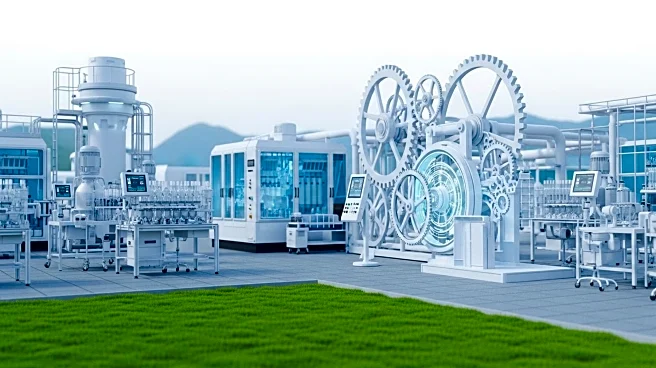What's Happening?
Eli Lilly has announced plans to invest over $1 billion in India to expand its manufacturing capacity. This move is part of a broader strategy to increase the availability of its key drugs, including treatments for obesity, diabetes, Alzheimer's, cancer, and autoimmune conditions. The investment comes at a time when global drugmakers are enhancing U.S. manufacturing capabilities following a 100% tariff imposed by the Trump administration on imported branded and patented drugs. Eli Lilly's expansion includes setting up a new manufacturing and quality facility in Hyderabad, India, which will oversee the firm's contract manufacturing network across the country. Recruitment for the new site will begin immediately, with plans to hire engineers, chemists, analytical scientists, quality control and assurance experts, and managers.
Why It's Important?
This investment is significant as it highlights Eli Lilly's commitment to expanding its global manufacturing footprint, particularly in India, which is seen as a hub for capability building within its global network. The move is expected to bolster the availability of essential medications, addressing the growing demand for obesity treatments in India, projected to have the world's second-largest obese population by 2050. Additionally, the investment aligns with the company's strategy to counteract the impact of tariffs on imported drugs by enhancing domestic production capabilities. This expansion could also lead to increased competition from India's generic drugmakers, who are preparing to launch cheaper versions of Eli Lilly's weight-loss drugs once patents expire.
What's Next?
Eli Lilly's immediate next steps include recruiting skilled professionals for its new facility in Hyderabad, which will play a crucial role in managing the company's contract manufacturing operations in India. The company is also preparing for increased competition from local generic drug manufacturers, which could impact its market share once patents on key ingredients expire. Furthermore, Eli Lilly's investment in India is part of a larger $27 billion expansion plan to build four new U.S. plants over the next five years, indicating a strategic focus on enhancing manufacturing capabilities both domestically and internationally.
Beyond the Headlines
The expansion into India not only represents a strategic business decision but also reflects broader trends in the pharmaceutical industry, where companies are increasingly looking to diversify their manufacturing bases to mitigate risks associated with tariffs and supply chain disruptions. This move could also have ethical implications, as it may influence the availability and affordability of essential medications in developing countries, potentially impacting public health outcomes.










